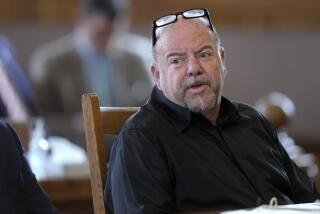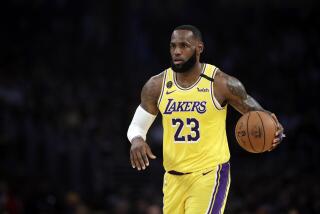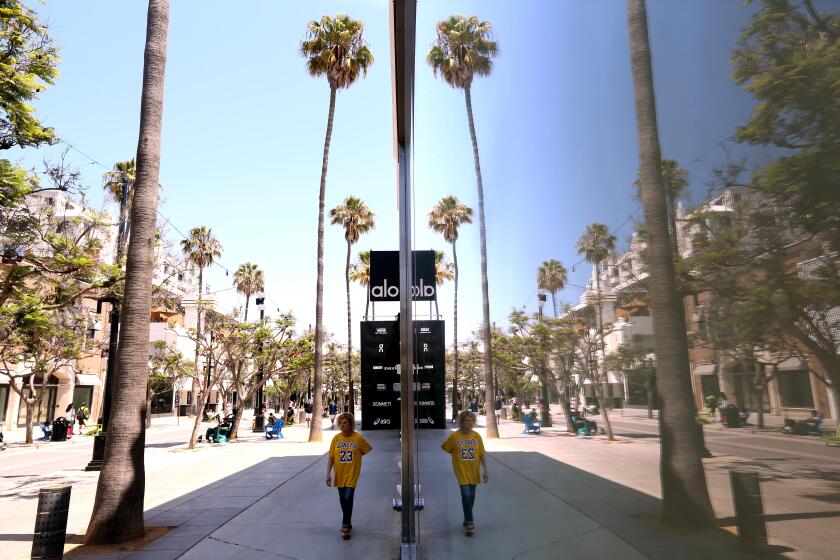FCC launching $4-billion program to narrow digital divide
The Federal Communications Commission is launching a $4-billion program to narrow the digital divide by making high-speed Internet access and computers more affordable for more than 25 million mainly low-income Americans.
The FCC said a public-private partnership, which includes major broadband and computer companies and nonprofits, will make “the biggest effort ever” across the nation to help poorer citizens as well as rural residents, seniors and minorities obtain broadband access.
Those who qualify would pay $9.95 a month for Internet access at 1 megabit per second and $150 for a refurbished laptop running the Windows 7 operating system, along with applications that include digital literacy training.
“We’re at a time of real challenge in the economy, and broadband access is becoming increasingly vital to participating in it,” FCC Chairman Julius Genachowski said Tuesday.
The program, to be unveiled Wednesday, is aimed at providing qualifying residents with greater access to both professional and educational opportunities while expanding consumer demand for the online marketplace. The effort, Genachowski said, should end up stimulating the economy as well.
“Steve Jobs was born into a lower-middle-class family, but part of his story is he had access to then cutting-edge technology because his father was a mechanic in Silicon Valley,” Genachowski said.
“If we give children better digital technology, we’re much more likely to see the next generation of innovators like Steve Jobs develop,” he said.
About one-third of Americans haven’t yet adopted broadband at home, the FCC said. That group disproportionately consists of the people who could be aided by the program.
Overall, the U.S. ranks 18th worldwide in the percentage of households with high-speed Internet access, according to the World Economic Forum.
A newly formed nonprofit organization, Connect to Compete, will operate the program, which the FCC will oversee. It will launch on a small scale this spring in yet-to-be-determined areas and roll out nationwide in September.
The program won’t be publicly funded. Instead, Microsoft Corp., the John S. and James L. Knight Foundation, and Redemtech Inc., a Columbus, Ohio, company that refurbishes used computers, will be among the major participants covering the cost, either in cash or with in-kind services.
The program eventually will offer participants the option of paying $250 for desktops and tablets as well.
Families will qualify for the program if their children are among the 32 million students who also qualify for free school lunches. They also have to be new users who have not had Internet access for at least 90 days.
Even though the nation has a 9% unemployment rate, several sectors have job openings. But more than 100 million Americans don’t have access to online job postings or the digital literacy skills required to be hired for them, Genachowski said.
At least 80% of Fortune 500 companies, such as Wal-Mart Stores Inc., Target Corp. and Exxon Mobil Corp., require that job applications be submitted online. That puts more than half of low-income families and more than half of African American and Latino families at a disadvantage because they don’t have broadband access.
Students without a fast Internet connection typically must wait for library computers to finish homework, or they find that their teachers hold back on the scope of research and homework assignments.
A 2009 technology immersion study in Texas found that low-income students who were given laptops to study at home tested higher in both reading and math and participated more in group projects and discussions than those who did not have online access at home.
Without the Internet or a computer at home, the struggle to complete homework or learn marketable computer skills eventually makes it harder for students to compete in the job market, Genachowski said.
The program is scheduled to run for three years, and those who qualify within that period can take advantage of the special offers for two years. Genachowski said he hoped the program would prove itself so beneficial that it would continue for a longer period.
“I’m confident this will work and that we’ll see real creativity and innovation that will help us chart a course for the future,” he said.
All major and most other cable companies — covering all 50 states and 86% of the population — are taking part in the project.
Ways to expand broadband access nationwide have eluded previous FCC boards and administrations. President Obama made the effort a major goal when he took office by appointing Genachowski, his campaign’s top technology advisor, as FCC chairman.
Obama outlined plans this year to extend wireless telecommunications coverage to 98% of Americans over the next five years, including a $5-billion government infrastructure investment in rural areas.
More to Read
Inside the business of entertainment
The Wide Shot brings you news, analysis and insights on everything from streaming wars to production — and what it all means for the future.
You may occasionally receive promotional content from the Los Angeles Times.










